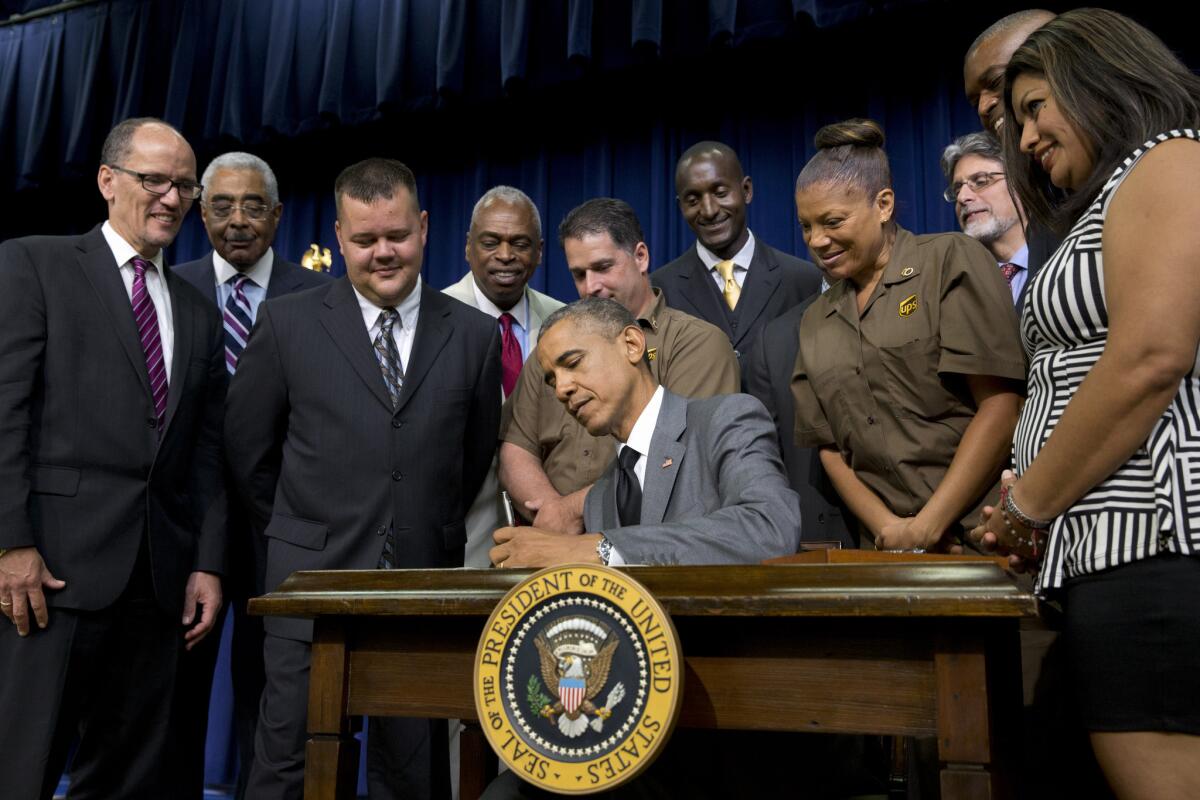Obama strikes a blow against the scourge of forced arbitration

- Share via
Little noticed in coverage of President Obama’s signing of the Fair Play and Safe Workplaces executive order July 31 was a provision that has been called “one of the most important positive steps for civil rights in the last 20 years.”
The statement comes from Paul Bland of the public interest group Public Justice, quoted by Emily Bazelon of Slate. He’s right; what he’s referring to is a provision of the order that bars employers from forcing workers to bring workplace discrimination, sexual assault or sexual harassment cases only through arbitration. As Bazelon reports, the order applies to firms with federal contracts valued at more than $1 million. But that’s plenty.
The arbitration provision got little attention in the media, in part because business lobbyists were so busy carrying on about other aspects of the executive order.
As my colleague Christi Parsons reported, businesses are exercised about a rule requiring prospective federal contractors to disclose labor law violations dating back three years and government agencies to take those violations into account when handing out federal contracts. The idea is to goad employers into settling the violations before they apply for contracts.
Business mouthpieces complain that the provision will create a “blacklist” barring companies with even minor violations from hopping on the government gravy train. Repeat after me: “Tough.”
The arbitration provision, however, addresses what may be an even more important abuse. As a private venue for dispute resolution, arbitration may be an effective way to keep commercial disagreement from clogging court dockets. That’s true chiefly when all the parties come to arbitration with roughly equivalent resources.
When it’s used by employers against employees, or by corporations against aggrieved customers, and when it’s forced down complainants’ throats against their wishes, however, it’s a scourge.
Arbitration provisions have proliferated everywhere, and it’s a safe bet that many, if not most, people forced into arbitration didn’t even know they were subject to the requirement until after their dispute arose -- arbitration clauses are buried in the boilerplate you sign when you enroll with a cable company, go to a doctor or hospital, or take a new job. Arbitration typically favors the bigger party -- they know their way around the process better, and they can take better advantage of what are often very loose standards of evidence and testimony in arbitration.
The Obama order strikes at the heart of this injustice by allowing complaints about workplace discrimination or abuse to be arbitrated only with the consent of the parties after the disputes arise. Surprise arbitration clauses, in other words, are out.
It’s hard not to see the order as a reproach to the Supreme Court and other courts. Judges are are big fans of arbitration, in part because it keeps tedious commercial disputes out of their hair. The key case upholding arbitration clauses involved AT&T and a customer dispute over the real cost of “free” cellphones sold by the mobile carrier.
A California federal judge and the 9th Circuit Court of Appeals rejected AT&T’s demand to compel arbitration. But the Supreme Court sided with the company in a 5-4 ruling (naturally).
This was a reflection of what legal scholar David Cole recently called the Court’s “unremittingly conservative” narrowing of access to the judiciary to remedy legal wrongs. The Earl Warren Court, he observed, “viewed the courts’ highest calling in a constitutional democracy as safeguarding those who cannot protect themselves through the political process.” The Roberts Court puts its thumb on the other side of the scale.
The Obama order shifts the balance just a little bit back the other way.
Keep up to date with The Economy Hub by following @hiltzikm.
More to Read
Inside the business of entertainment
The Wide Shot brings you news, analysis and insights on everything from streaming wars to production — and what it all means for the future.
You may occasionally receive promotional content from the Los Angeles Times.











